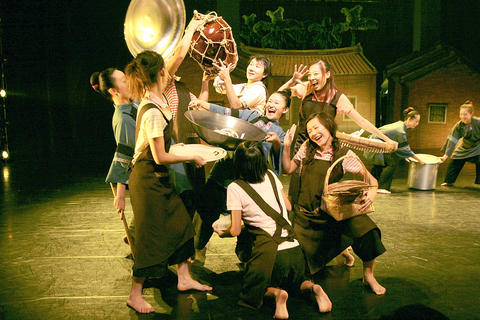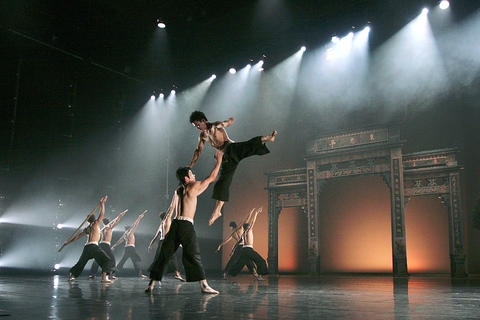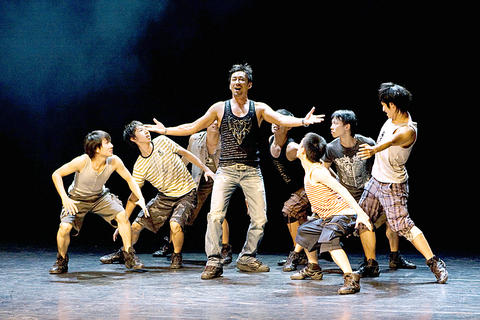Though Taiwan has no Broadway or West End, the popularity of musicals here is well established with recent foreign productions selling out at the box office. It's surprising, however, that Taiwan hasn't developed more indigenous musicals because the variety of operatic forms that are found on these shores, such as beiguan (北管), nanguan (南管) and especially Taiwanese folk opera (歌仔戲), all contain the necessary components of dance, song and acting necessary to pull off such a production.
If locally produced musicals are a rarity in Taiwan, the creators of My Daughter's Wedding (福春嫁女), beginning tonight at the National Theater, have gone one step further by producing a "Hakka musical."
The production "is supported by the council of Hakka Affairs and they are determined to promote Hakka culture and … make people more knowledgable about Hakka people's life," said Hong Kong stage director David Jiang (蔣維國).

PHOTOS: COURTESY OF LAI CHIH-SHENG
Neither the musical's director nor composer is Hakka, and the Taipei National University of the Arts (TNUA), hardly a bastion of Hakka culture, produces the musical. Aside from the language used in some of the scenes and a few scenes that employ Hakka cultural elements, what makes My Daughter's Wedding a Hakka musical?
The production is composed of over 200 performers - mainly TNUA students - including an orchestra, choir and a handful of Hakka musicians. Jiang says there are many parallels between My Daughter's Wedding and The Taming of the Shrew, Shakespeare's play on which the musical is based.
The Bard's comedy tells the story of two suitors competing to marry the daughter of a wealthy merchant. The father informs the two young men that his younger daughter cannot marry until her older, shrewish sister is married first (a preference Jiang says is very similar to "Chinese tradition"). The would-be grooms search for a suitable partner for the carping catch. My Daughter's Wedding employs the same conceit, but with a twist. Rather than interviewing a number of suitors for his eldest daughter, the father holds a contest, the winner of which takes home the bride.

PHOTOS: COURTESY OF LAI CHIH-SHENG
Three scriptwriters - Lin Jian-hua (林建華) and Wang Yo-hui (王友輝) working in Mandarin, and Huang Yu-shan (黃武山) working in Hakka - adapted the script into a combination of Mandarin and Hakka, with subtitles in Chinese and English. About half the production takes place in Taipei and is delivered in Mandarin.
The second part has the couple traveling to Meinong (美濃), the groom's hometown, where they are feted by the village women. Though this event has nothing to do with the original story, Jiang says it provides the perfect context to create a variety of dance movements to celebrate traditional Hakka culture.
My Daughter's Wedding tones down the overt battle between the sexes in The Taming of the Shrew.

PHOTOS: COURTESY OF LAI CHIH-SHENG
Composer Chien Nan-chang (錢南章), who received best musical work and best recording gongs at the 2005 Golden Melody Awards for his Buddhist Requiem and is a winner of the 2005 National Award for the Arts, uses operatic music and Hakka tonality for the score.
As the Hakka community was historically excluded from the mainstream artistic community, there aren't enough singers, dancers and actors necessary to pull the production off.
Jiang seems to implicitly understand this as he calls the production a work in progress or "a first draft."
"We don't have the tradition of Western-style musical in Asia ... . Therefore, it is difficult to find a performer who can sing, who can dance, who can act." Compounding the problem, many of the actors are unfamiliar with the Hakka language.
Why audiences should be exposed to a first draft, rather than a finished piece, especially considering the performance only runs for three days and not three months or three years, is unclear.
Still, in terms of the set, costume and choreography, the production has brought together some of Taiwan's most respected artists which should ensure that those who love musicals will not be disappointed by the lavish production.

Last week, on the heels of the recall election that turned out so badly for Taiwan, came the news that US President Donald Trump had blocked the transit of President William Lai (賴清德) through the US on his way to Latin America. A few days later the international media reported that in June a scheduled visit by Minister of National Defense Wellington Koo (顧立雄) for high level meetings was canceled by the US after China’s President Xi Jinping (習近平) asked Trump to curb US engagement with Taiwan during a June phone call. The cancellation of Lai’s transit was a gaudy

Following the shock complete failure of all the recall votes against Chinese Nationalist Party (KMT) lawmakers on July 26, pan-blue supporters and the Chinese Communist Party (CCP) were giddy with victory. A notable exception was KMT Chairman Eric Chu (朱立倫), who knew better. At a press conference on July 29, he bowed deeply in gratitude to the voters and said the recalls were “not about which party won or lost, but were a great victory for the Taiwanese voters.” The entire recall process was a disaster for both the KMT and the Democratic Progressive Party (DPP). The only bright spot for

From Godzilla’s fiery atomic breath to post-apocalyptic anime and harrowing depictions of radiation sickness, the influence of the nuclear bombings of Hiroshima and Nagasaki runs deep in Japanese popular culture. In the 80 years since the World War II attacks, stories of destruction and mutation have been fused with fears around natural disasters and, more recently, the Fukushima crisis. Classic manga and anime series Astro Boy is called “Mighty Atom” in Japanese, while city-leveling explosions loom large in other titles such as Akira, Neon Genesis Evangelion and Attack on Titan. “Living through tremendous pain” and overcoming trauma is a recurrent theme in Japan’s

As last month dawned, the Democratic Progressive Party (DPP) was in a good position. The recall campaigns had strong momentum, polling showed many Chinese Nationalist Party (KMT) lawmakers at risk of recall and even the KMT was bracing for losing seats while facing a tsunami of voter fraud investigations. Polling pointed to some of the recalls being a lock for victory. Though in most districts the majority was against recalling their lawmaker, among voters “definitely” planning to vote, there were double-digit margins in favor of recall in at least five districts, with three districts near or above 20 percent in